译林牛津版六年级知识点整理
牛津译林版小学六年级英语上册 Unit4单元知识 总结

牛津译林版小学六年级英语上册 Unit4单元知识总结一·四会单词1.ago2.office2.office办公室3.newspaper(可数)报纸4.news 新闻5. watch 观看(动)6.e-book 电子书7.with 用;和...一起(介词)8.yesterday 昨天二.四会词组1.six years ago 六年前2.write letters写信write letters to sb 写信给某人3.in the office 在办公4.read newspapers for news读报纸获得新闻5.read e-books 读电子书6.call people 给人们打电话7.watch news观看新闻8.write emails = write an email 写电子邮件9.then and now 过去和现在10.make friends 交朋友11.listen to the radio 听广播listen to me 听我说12.on the Internet 在网上13.all over the world 全世界14.at school 在学校15.buy things from shops 从商店买东西16.be on holiday 在度假e sth to do sth 使用某物做某事use the telephone to call poople 使用电话给人们打电话18.do shopping =go shopping 购物19.work hard 努力工作20.look out of ...朝...外看21.wait for+宾格(me.him.her ) 等待...22.go on(doing sth)继续(做某事)23.get angry = be angry (形)生气24.make a sentence with ..用...造句25.in the cake 在蛋糕里26.an English lesson 一节英语课27.a mobile phone 一部手机28.an e-book 一个电子书29.six years old 六岁30.invent the train 发明火车三.四会句子1.Six years ago , Mike could read and draw ,but he could not write .六年前,迈克会阅读和画画,但是他不会写字。
牛津译林版六年级上册英语Unit1 king's new clothes 知识点复习资料
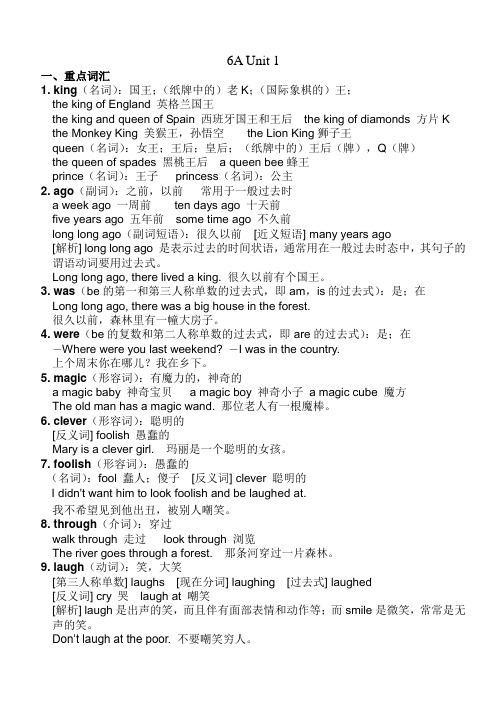
6A Unit 1一、重点词汇1. king(名词):国王;(纸牌中的)老K;(国际象棋的)王;the king of England 英格兰国王the king and queen of Spain 西班牙国王和王后the king of diamonds 方片K the Monkey King 美猴王,孙悟空the Lion King狮子王queen(名词):女王;王后;皇后;(纸牌中的)王后(牌),Q(牌)the queen of spades 黑桃王后 a queen bee蜂王prince(名词):王子princess(名词):公主2. ago(副词):之前,以前常用于一般过去时a week ago 一周前ten days ago 十天前five years ago 五年前some time ago 不久前long long ago(副词短语):很久以前[近义短语] many years ago[解析] long long ago 是表示过去的时间状语,通常用在一般过去时态中,其句子的谓语动词要用过去式。
Long long ago, there lived a king. 很久以前有个国王。
3. was(be的第一和第三人称单数的过去式,即am,is的过去式):是;在Long long ago, there was a big house in the forest.很久以前,森林里有一幢大房子。
4. were(be的复数和第二人称单数的过去式,即are的过去式):是;在-Where were you last weekend? -I was in the country.上个周末你在哪儿?我在乡下。
5. magic(形容词):有魔力的,神奇的a magic baby 神奇宝贝 a magic boy 神奇小子a magic cube 魔方The old man has a magic wand. 那位老人有一根魔棒。
牛津译林版英语六年级上册Units1-4 重难点知识归纳总结
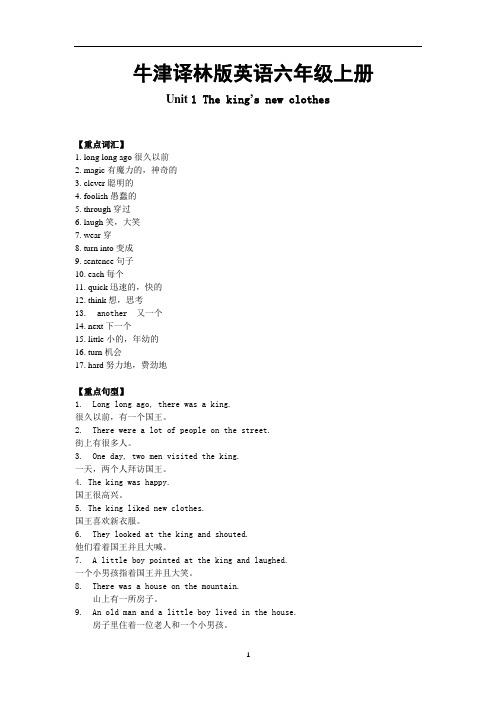
牛津译林版英语六年级上册Unit 1 The king’s new clothes【重点词汇】1. long long ago 很久以前2. magic 有魔力的,神奇的3. clever 聪明的4. foolish 愚蠢的5. through 穿过6. laugh 笑,大笑7. wear 穿8. turn into 变成9. sentence 句子10. each 每个11. quick 迅速的,快的12. think 想,思考13. another 又一个14. next 下一个15. little 小的,年幼的16. turn 机会17. hard 努力地,费劲地【重点句型】1. Long long ago, there was a king.很久以前,有一个国王。
2. There were a lot of people on the street.街上有很多人。
3. One day, two men visited the king.一天,两个人拜访国王。
4. The king was happy.国王很高兴。
5. The king liked new clothes.国王喜欢新衣服。
6. They looked at the king and shouted.他们看着国王并且大喊。
7. A little boy pointed at the king and laughed.一个小男孩指着国王并且大笑。
8. There was a house on the mountain.山上有一所房子。
9. An old man and a little boy lived in the house.房子里住着一位老人和一个小男孩。
10. The old man told the boy a story.老人给男孩讲了一个故事。
Unit 2 What a day!【重点词汇】1. sunny 晴朗的2. show 展览,展示3. interesting 有趣的,有意思的4. weather 天气5. become 变成,变为6. windy 有风的7. cloudy 多云的8. high 在高处9. honey 蜂蜜10. drink 饮料11. ant 蚂蚁12. bee 蜜蜂13. cloud 云14. rain 下雨15. rainy 多雨的16. meet 遇见17. lose 丢失18. know 知道19. climb up 爬上20. hold onto 抓紧23. fly away 飞走【重点句型】1. It was sunny/cloudy/windy/rainy.天气晴朗/多云/多风/多雨。
牛津译林版六年级上册英语全册语法知识点详解(unit1)
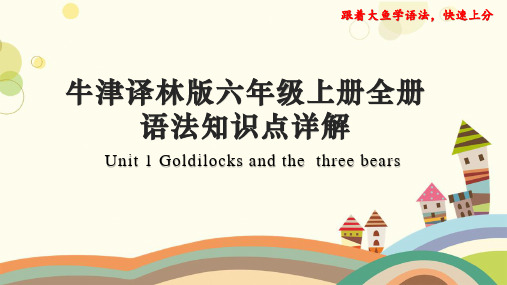
一、一般过去时的用法
(三)过去式变形规则 3. 其他动词。 (4)以“辅元辅”结尾的动词,双写这个辅音字母再加ed。如: stop→stopped、drop→dropped (5)不规则变化。如: go→went、see→saw、bring→brought、catch→caught、 sleep→slept、make→made、p)标志词 6. once(曾经);once upon a time(从前) eg: Once upon a time, the king liked new clothes. 7. last+一段时间(night/week/month/ year等) eg: We went shopping last Saturday. 8. ago(two days ago);long long ago eg: We had a picnic a week ago. 9. One day eg: One day, he got lost in the forest. 10.in +2020年以前的年份。 eg: Lily lived in Beijing in 2016.
二、现在进行时的用法
(四)注意事项 1. 根据主语单复数选用合适的be动词: 单数用is,复数用are 2. 动词ing的规则需牢记: (1)一般在动词后加ing。如:work→working、read→reading (2)以不发音的e结尾的动词,去掉e,再加ing。如:smile→smiling、write→writing。 (3)以重读闭音节结尾的且词尾只有一个辅音字母的,双写这个辅音字母加ing。常见的有: sit→sitting、stop→stopping、run→running、swim→swimming、shop →shopping。
译林牛津小学六年级英语6BU7知识点
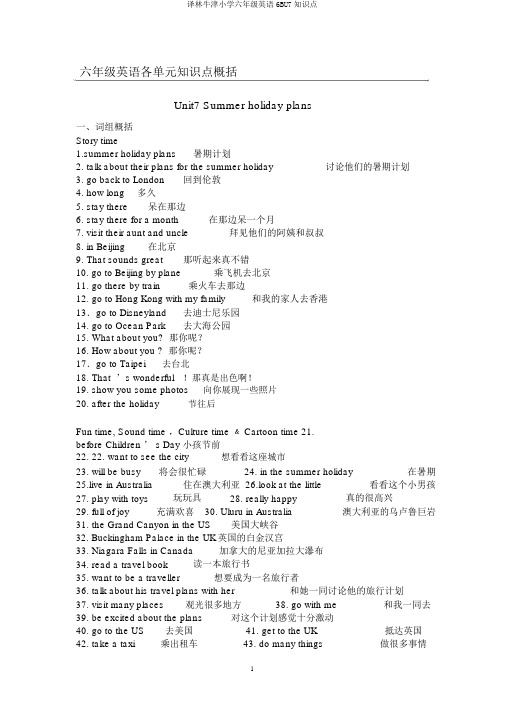
六年级英语各单元知识点概括Unit7 Summer holiday plans一、词组概括Story time1.summer holiday plans暑期计划2. talk about their plans for the summer holiday讨论他们的暑期计划3. go back to London回到伦敦4. how long多久5. stay there呆在那边6. stay there for a month在那边呆一个月7. visit their aunt and uncle拜见他们的阿姨和叔叔8. in Beijing在北京9. That sounds great那听起来真不错10. go to Beijing by plane乘飞机去北京11. go there by train乘火车去那边12. go to Hong Kong with my family和我的家人去香港13.go to Disneyland去迪士尼乐园14. go to Ocean Park去大海公园15.What about you? 那你呢?16.How about you ? 那你呢?17.go to Taipei去台北18. That ’s wonderful!那真是出色啊!19. show you some photos向你展现一些照片20. after the holiday节往后Fun time, Sound time ,Culture time ﹠ Cartoon time 21.before Children ’ s Day 小孩节前22. 22. want to see the city想看看这座城市23. will be busy将会很忙碌24. in the summer holiday在暑期25.live in Australia住在澳大利亚 26.look at the little看看这个小男孩27. play with toys玩玩具28. really happy真的很高兴29. full of joy充满欢喜 30. Uluru in Australia澳大利亚的乌卢鲁巨岩31. the Grand Canyon in the US美国大峡谷32. Buckingham Palace in the UK英国的白金汉宫33. Niagara Falls in Canada加拿大的尼亚加拉大瀑布34. read a travel book读一本旅行书35. want to be a traveller想要成为一名旅行者36. talk about his travel plans with her和她一同讨论他的旅行计划37. visit many places观光很多地方38. go with me和我一同去39. be excited about the plans对这个计划感觉十分激动40. go to the US去美国41. get to the UK抵达英国42. take a taxi乘出租车43. do many things做很多事情144. have a wonderful summer holiday有一个出色的假期二、要点句型 1. 你假期打算去哪儿?我打算去香港。
译林牛津六年级Culture time 知识整理
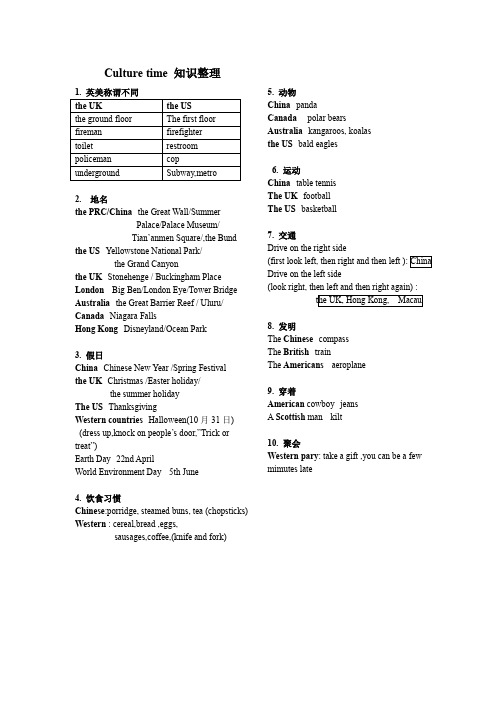
3. 假日 China--Chinese New Year /Spring Festival the UK--Christmas /Easter holiday/
the summer holiday The US--Thanksgiving Western countries--Halloween(10 月 31 日)
the UK, Hong Kong, Macau
8. 发明 The Chinese--compass The British--train The Americans-- aeroplane
9. 穿着 American cowboy--jeans A Scottish man --kilt
10. 聚会 Western pary: take a gift ,you can be a few mimutes late
(dress up,knock on people’s door,”Trick or treat”) Earth Day--22nd April World Environment Day --5th June
4. 饮食习惯 Chinese:porridge, steamed buns, tea (chopsticks) Western : cereal,bread ,eggs,
牛津译林版六年级英语上册第一单元6A Unit2词汇和句型知识点

6A Unit 2 What a day!一、词组1.go to the park by bike 骑自行车去公园2.go to school on foot/walk to school步行去上学3.become cloudy 变得多云4.look sad 看起来难过5.what a day怎样的一天啊st Sunday 上周日7.this Sunday 这周日8.next Sunday 下周日9.a parrot show 一场鹦鹉表演10.fly kites high in the sky把风筝放到高高的空中11.many black clouds许多乌云12.some interesting parrots 一些有趣的鹦鹉13.go away 走开14.fly away飞走15.want to know 想要知道16.near the hill 在小山附近17.bring some drinks 带来一些饮料18.fly too high 飞得太高19.in your diary 在你的日记里20.write about …写关于……21.cheer together 一起欢呼22.hold onto it紧紧抓住它23.lose my new kite 丢失我的新风筝24.lose one’s way 迷路25.bring lunch to the park带午餐去公园26.watch a film 看电影27.a busy day忙碌的一天28.go swimming去游泳29.climb up the hill爬上小山30. meet him in the park在公园遇见他31.time for lunch该吃午饭了32. pick three cards 挑选三张卡片e again another day改天再来34. on a rainy morning 在一个雨天的早上35.on Monday afternoon在周一下午36.do housework做家务37.find my English book找到我的英语书38.have a picnic on the grass在草地上野餐二、句型1. I get up at six every morning. But this morning, I got up at six thirty.我每天六点起床。
译林牛津英语6A知识点
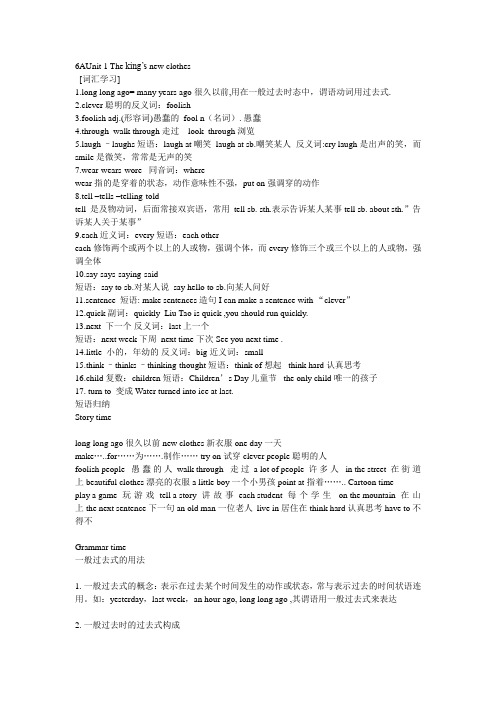
6AUnit 1 The king’s new clothes[词汇学习]1.long long ago= many years ago很久以前,用在一般过去时态中,谓语动词用过去式.2.clever 聪明的反义词:foolish3.foolish adj.(形容词)愚蠢的 fool n(名词). 愚蠢4.through walk through走过 look through浏览ugh –laughs 短语:laugh at 嘲笑 laugh at sb.嘲笑某人反义词:cry laugh 是出声的笑,而smile 是微笑,常常是无声的笑7.wear-wears-wore 同音词:wherewear指的是穿着的状态,动作意味性不强,put on 强调穿的动作8.tell –tells –telling-toldtell是及物动词,后面常接双宾语,常用tell sb. sth.表示告诉某人某事 tell sb. about sth.”告诉某人关于某事”9.each 近义词:every 短语:each othereach修饰两个或两个以上的人或物,强调个体,而every修饰三个或三个以上的人或物,强调全体10.say-says-saying-said短语:say to sb.对某人说 say hello to sb.向某人问好11.sentence 短语: make sentences 造句I can make a sentence with “clever”12.quick 副词:quickly Liu Tao is quick ,you should run quickly.13.next 下一个反义词:last 上一个短语:next week下周 next time 下次 See you next time .14.little 小的,年幼的反义词:big 近义词:small15.think –thinks –thinking-thought 短语:think of想起 think hard 认真思考16.child复数:children 短语:Children’s Day儿童节 the only child 唯一的孩子17. turn to 变成 Water turned into ice at last.短语归纳Story timelong long ago 很久以前 new clothes 新衣服 one day 一天make…..for……为…….制作…… try on试穿 clever people聪明的人foolish people愚蠢的人 walk through走过 a lot of people 许多人in the street 在街道上 beautiful clothes漂亮的衣服 a little boy 一个小男孩 point at指着…….. Cartoon timeplay a game 玩游戏 tell a story 讲故事 each student 每个学生on the mountain 在山上 the next sentence 下一句 an old man 一位老人live in 居住在 think hard 认真思考 have to 不得不Grammar time一般过去式的用法1. 一般过去式的概念:表示在过去某个时间发生的动作或状态,常与表示过去的时间状语连用。
- 1、下载文档前请自行甄别文档内容的完整性,平台不提供额外的编辑、内容补充、找答案等附加服务。
- 2、"仅部分预览"的文档,不可在线预览部分如存在完整性等问题,可反馈申请退款(可完整预览的文档不适用该条件!)。
- 3、如文档侵犯您的权益,请联系客服反馈,我们会尽快为您处理(人工客服工作时间:9:00-18:30)。
知识点归纳班级: 姓名:句子时态归纳一、一般现在时(句子中通常有always,usually,often,sometimes,never,every…, on Mondays/…)1、句型结构:主语+V、(s)如果主语就是三单,谓语动词加s或者es、例如:Helen likes listening to music、My sister has a toy cat、如果主语不就是三单,谓语动词用原形。
例如:I like listening to music、I have a toy cat、2、动词+s/es形式(1)一般动词后加s 如reads(2)以s、x 、ch、sh 结尾,加es 如watches(3)以辅音字母+o 结尾,一般加es 如goes(4)辅音+y 结尾,变y为i ,再加es如worries、二、一般现在进行时(句子中通常有now,listen, look, 具体时间等)1、句型结构:主语+ be +V、ing例如:I am singing in the classroom、Liu Tao is reading in the bedroom、2、动词ing形式(1)一般情况直接加ing, play —playing(2)以不发音的“e”结尾,去“e”加ing,skate —skating(3)双写词尾字母加ing,sit—sitting, swim—swimming, run—running,put—putting, get—getting, begin—beginning,shop—shopping, stop—stopping三、一般过去时(句子中通常有just now,…ago,yesterday,last…, before等)1、句型结构:主语+ V、ed谓语动词加ed(不规则动词:go-went,come-came等)例如:I listened to music last night、Liu Tao went to the zoo yesterday、2、动词ed形式(1)一般情况直接+ede、g、play – played(2)闭音节单词双写末尾单词+ede、g、stop – stopped, shop – shopped(3)原形与过去式同型e、g、read-read,hit-hit, put-put,let-let,cut-cut,lose—lost(4)以辅音+y结尾去y变i+ede、g、copy-copied,cry-cried,study-studied,become-became(5)不规则动词的过去式is-was am-was are-were do-did can-could begin-began bring-brought buy-bought catch-caught teach-taughtchoose-chose come-came get-got draw-drew keep-keptdrive-drove eat-ate find-found fly-flew forget-forgothear-heard give-gave go-went grow-grew have-haddrink-drank try--tried know-knew learn-learnt/learned make-madesend-sent meet-met hold--held wear--wore ride-rodering-rang run-ran say-said see-saw shall-shouldsing-sang sit-sat sleep-slept speak-spoke spend-spentstand-stood sweep-swept swim-swam take-took teach-taught 四、一般将来时(句子中通常有tomorrow,next…,soon,this afternoon,this evening)谓语动词结构就是:be going to +do(表示计划、打算做…) 或者will +do(表示即将发生…)句型结构:主语+ be going to / will + V、原形例如: I am going to have an English lesson tomorrow、He will have an English lesson tomorrow、动词使用1、用动词原形(1)情态动词:can,can’t ,should,shouldn’t,must,mustn’t,could,couldn’t,will,won’t 后面用动词原形,(2)助动词do,don’t, does,doesn’t,did,didn’t后面用动词原形。
(3)let,help 后面用动词原形2、动词加inglike doing, love doing, go doing, finish doing, stop doingNo doing(禁止做某事e、g、No eating or drinking、)介词(be good at,about,for)后面动词加ing等3、加to加动词原形want to do,would like to do,have to do(不得不做某事),be going to do ,how to do(怎么样做某事),it’s time to do(…的时间到了), forget to do…(忘记做……), remember to do(记得做…),try to do (试着做…),use/reuse to do(用/再利用…做…),主格,宾格,形容词性物主代词主格宾格形物我(的) I me my我们(的) we us our您(的) you you your您们(的) you you you她(的) he him his她(的) she her her它(的) it it its她们(的) they them their动词与介词后用宾格:动词如:help( help me) / let (let us) / make (you) …介词如:for(me) / from(him) /to (you) …名词使用1、a lot of,lots of,some,a few,many,how many后面加可数名词复数,a lot of,lots of,some,a little,much,how much后面加不可数名词。
2、可数名词与不可数名词的分类可数名词不可数名词sweet(s), cake(s), ice cream(s), egg(s),noodle(s), hamburger(s), sandwich(es),hot dog(s), lollipop(s), sausage(s), steamed bun(s), vegetable(s), carrot(s), bean(s), tomato(es), potato(es), apple(s), pear(s), peach(es), mango(es), grape(s)…water, milk, juice, coffee, cola, tea, soup, porridge, cereal, rice, bread, meat…3、名词单复数(1)一般情况,+s(2)名词以s、x、sh、ch结尾,+es(3)名词以“o”结尾,有生命的+es (如potato —potatoes);无生命的+s(如photo —photos)(4)名词以“y”结尾,元音(a,e,i,o,u)+y结尾——直接+s;辅音+y结尾——去y变i+es(5)名词以“f”/“fe”结尾,去f/fe变ve+s(6)特殊:man——men, tooth——teeth,foot——feet,child——children形容词,副词1、形容词用于修饰名词:He is a happy boy、副词用于修饰动词:He always sing happily、2、连系动词用形容词修饰:be动词(is, am, are), look, feel, keep, smell, taste, sound, get, become, make…举例:look happy, feel good, keep healthy, smell nice, taste good, sound good, become sunny3、形容词到副词的变化规律形容词副词形容词副词形容词副词一般情况直接+ly 特殊变化辅音+y结尾, 去y变i +lybeautiful beautifully good well happy happilycareful carefully 形容词、副词同形angry angrilyloud loudly high high easy easilybad badly fast fast busy busilyexcited excitedly early early heavy heavilyquiet quietly late latequick quicklyslow slowlysad sadly动词变职业名词1、动词+er/r结尾:play --- player, teach --- teacher, sing --- singer, work --- worker,clean --- cleaner, drive --- driver, write --- writer, dance --- dancer,paint --- painter,love --- lover, travel --- traveller2、+orvisit --- visitor3、-ist结尾:piano --- pianist,science --- scientist, art --- artist,牙医dentist4、- man结尾:post --- postman, milk --- milkman, space --- spaceman, fire --- fireman___5、男/女职业:police --- policeman(男),police --- policewoman(女)act --- actor(男), act --- actress(女)wait --- waiter(男), wait --- waitress(女)6、医生doctor,护士nurse,农民farmer,宇航员astronaut7、China中国-Chinese中国人America美国-American美国人France法国-French法国人the UK英国-British英国人England英国- English英国人Australia澳大利亚- Australian澳大利亚人Japan日本- Japanese 日本人the US/ America美国- American 美国人句型转化一、一般疑问句做法:(1)有Be动词(am\is \ are\was\were)时,将Be动词提到句首,剩余部分照抄;(2)有情态动词can/would/must/will/should时,将can/would/must/will/should提到句首,剩余部分照抄;(3)没有Be动词(am\is \ are\was\were)与情态动词can/would/must/will/should时,句首用助动词do/does/did;(4)注意点:I变you, my 变your, us变you, me变you, our 变your、some变any二、否定句(1)在句中的动词am\is \ are\was\were或can/would/must/will/should后面加not、或(2)如果没有am\is \ are\was\were或can/would/must/will/should就在动词前加don’t, doesn’tdidn’t、三、划线部分提问:根据划线内容找到疑问词。
